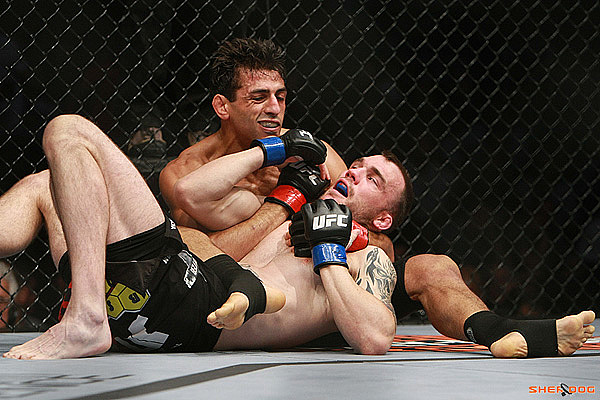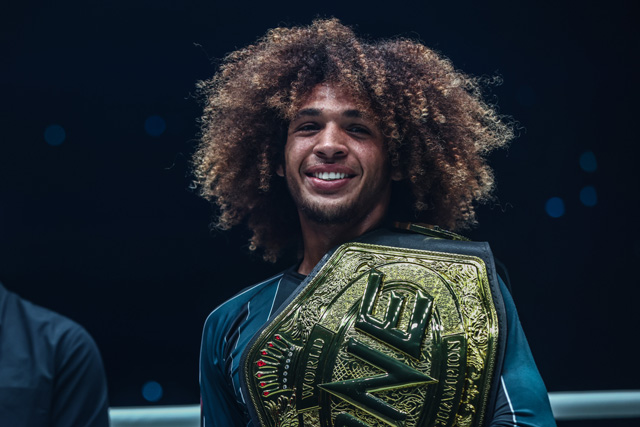Life After Loss: An Aussie’s Return
Todd Martin Jul 2, 2011

George Sotiropoulos will need to rebound from his first loss
since 2006. | Photo: Dave Mandel/Sherdog.com
In an MMA world where memories are short and reputations quickly made or ruined, one fight can radically alter the trajectory of a fighter’s career. Just four months ago, George Sotiropoulos was riding high on a seven-fight UFC winning streak. The popular Australian was mentioned as a potential title challenger for a major stadium show Down Under.
Then Sotiropoulos ran into underrated German kickboxer Dennis Siver at UFC 127. Siver scored a unanimous decision win, and Sotiropoulos found himself moving backwards for the first time in many years. When he returns to the cage against Rafael dos Anjos at UFC 132 “Cruz vs. Faber 2” on Saturday at the MGM Grand Garden Arena in Las Vegas, it will be his first preliminary bout in five appearances.
Advertisement
“I don’t really have trouble dedicating myself,” Sotiropoulos tells Sherdog.com. “One loss doesn’t change everything I’m doing. I’m driven and motivated. I don’t need something to motivate me to train. What’s motivating me is the fight itself. I looked at what didn’t work in the last fight and made improvements to make myself better. I want to go all the way.”
Some fighters react to losses by making radical changes. They
switch training camps. They move up or down in weight. They focus
on one specific aspect of their game. However, Sotiropoulos
believes he has been doing the right things and that the same
traits that kept him winning for so long will help him rebound from
his first UFC loss.
“It’s not like I’m reinventing the wheel,” Sotiropoulos says. “I’m a well-developed fighter. I’ve got jiu-jitsu, submission grappling, wrestling and boxing. I’ve competed in all of those. I’ve fought and trained all over the world. When you have a race car and it comes into a pit stop, you don’t give it an overhaul. You change little parts, and sometimes those small adjustments make big differences.”
Even in the setback against Siver, there were positive signs of development for Sotiropoulos. He was unable to get the fight to the ground, which many figured would signal severe danger for the jiu-jitsu specialist. Indeed, in the first round, Sotiropoulos was knocked down twice and battered in the standup. However, as the fight progressed, Sotiropoulos recovered and held his own against an elite striker. It was a signal that his long focus on striking was paying dividends.
Rafael
dos Anjos File Photo
Dos Anjos has an elite ground game.
Moving to Washington to train may not seem like a significant sacrifice for a fighter from California or New York, but it is a different story for someone from halfway around the world. As Australia’s best-known and most-popular MMA fighter, Sotiropoulos carries the banner for an emerging MMA market.
When Sotiropoulos was growing up, martial arts did not have a strong presence in Australia. There were a few karate dojos and a couple of local boxing gyms nearby but not much that could launch a young fighter towards professional combat sports.
Luckily, one of the few jiu-jitsu facilities in the country -- a Machado jiu-jitsu affiliate -- was located near Sotiropoulos. He began training in the discipline and developed his first base.
A fan of MMA from early UFC VHS tapes, Sotiropoulos developed a piecemeal approach to learning a sport for which few in his country were specifically training. He learned jiu-jitsu from jiu-jitsu trainers, boxing from boxing trainers and freestyle wrestling from freestyle wrestlers. His training partners often had no idea about how to integrate their specific techniques into the larger sport, or even that the larger sport existed.
“At the time of my last fight in Australia before the UFC in 2006, not that many people knew about the sport,” says Sotiropoulos. “When I said I was fighting MMA, people wouldn’t know what it was. When I went sparring, I would try to explain MMA. They didn’t understand what it was, so I would just give up. I was there to work.”
And work he did during that period. Sotiropoulos has a degree in finance and was working a job at a bank specifically to finance his MMA training. All the money he earned was funneled into training, which became his life’s passion. He eventually was good enough to compete on “The Ultimate Fighter” -- he reached the semifinals as a welterweight on Season 6 -- and train in the United States. His career took off from there.
“
and it comes into a pit
stop, you don’t give it
an overhaul. You change
little parts, and sometimes
those small adjustments
make big differences.
”
“Right now, the U.S. is my home, but Australia is my home,” Sotiropoulos says. “I’m here to get my training, but my development came in Australia. Most everything happened there and was the springboard. I’m a lot better now, but I consider myself a homegrown fighter.”
While Sotiropoulos traveled halfway around the world from Oceania to train, his opponent at UFC 132 often makes the trek in the other direction, traveling from Brazil to Singapore to hone his skills. Dos Anjos does not have the highest name value or popularity in the UFC, but he is a skilled veteran with a comparable skillset to Sotiropoulos. The match will serve as Sotiropoulos’ first step on the road back to title contention.
“He’s got some definite strengths, like his jiu-jitsu and Muay thai,” Sotiropoulos says. “His UFC record doesn’t do him justice, but he’s a high-level guy. He’s got good grappling, takedown and standup. It’s a different type of fighter than some of my other recent opponents.”
A victory over Dos Anjos seems unlikely to catapult Sotiropoulos back into the immediate title picture, but the process of winning one fight at a time and moving up the ladder is nothing new for the 33-year-old MMA veteran. While Sotiropoulos is focused on turning in an impressive performance against Dos Anjos, the quest to be champion remains his ultimate goal.
“My focus has always been on performing well, winning and fighting my fight,” Sotiropoulos says, “but, yeah, I want to win that belt. I was pretty damn close, and I’m still determined to get there.”
Related Articles







